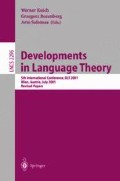Abstract
We review the rudiments of the equational logic of (least) fixed points and provide some of its applications for axiomatization problems with respect to regular languages, tree languages, and synchronization trees.
Partially supported by grants T30511 and T35163 from the National Foundation of Hungary for Scientific Research and the Austrian-Hungarian Action Foundation.
Access this chapter
Tax calculation will be finalised at checkout
Purchases are for personal use only
Preview
Unable to display preview. Download preview PDF.
References
L. Aceto, Z. Ésik and A. Ingólfsdóttir. A fully equational proof of Parikh’s theorem, BRICS Report Series, RS-01-28, 2001.
J.W. De Bakker and D. Scott. A theory of programs, IBM Seminar, Vienna, 1969.
H. Bekić. Definable operations in general algebra. Technical Report, IBM Laboratory, Vienna, 1969.
L. Bernátsky and Z. Ésik, Semantics of flowchart programs and the free Conway theories. RAIRO Inform. Théor. Appl., 32(1998), 35–78.
S. L. Bloom and Z. Ésik. Floyd-Hoare logic in iteration theories. J. Assoc. Comput. Mach., 38(1991), 887–934.
S. L. Bloom and Z. Ésik. Program correctness and matricial iteration theories. In: Proc. MathematicalFoundations of Programming Semantics’91,LNCS 598, Springer-Verlag, 1992, 457–475.
S. L. Bloom and Z. Ésik. Iteration Theories. Springer-Verlag, 1993.
S. L. Bloom, Z. Ésik and D. Taubner. Iteration theories of synchronization trees. Inform. and Comput., 102(1993), 1–55.
S. Bozapalidis. Equational elements in additive algebras. Theory Comput. Syst., 32(1999), 1–33.
J. H. Conway. Regular Algebra and Finite Machines, Chapman and Hall, 1971.
B. Courcelle, G. Kahn and J. Vuillemin. Algorithmes d’équivalence et de réduction á des expressions minimales dans une classe d’équations récursives simples. In Proc. ICALP 74, Saarbrücken, LNCS 14, Springer, 200–213.
C. C. Elgot, S. L. Bloom and R. Tindell. On the algebraic structure of rooted trees. J. Comput. System Sci., 16(1978), 362–399.
J. Engelfriet and E. M. Schmidt. IO and OI. I. J. Comput. System Sci., 15(1977), 328–353.
Z. Ésik. Identities in iterative and rational algebraic theories. Comput. Linguist. Comput. Lang., 14(1980), 183–207.
Z. Ésik. Completeness of Park induction. Theoret. Comput. Sci., 177(1997), 217–283.
Z. Ésik Axiomatizing the equational theory of regular tree languages. In: Proc. STACS 98, Paris, LNCS 1373, Springer, 1998, 455–466.
Z. Ésik. Group axioms for iteration. Inform. and Comput., 148(1999), 131–180.
Z. Ésik. Axiomatizing the least fixed point operation and binary supremum. In: Proc. CSL 2000, LNCS 1862, Springer-Verlag, 302–316.
Z. Ésik and H. Leiß. In preparation.
F. Gécseg and M. Steinby. Tree Automata. Akadémiai Kiadó. Budapest, 1984.
A. Ginzburg. Algebraic theory of automata. Academic Press, NewYork-London, 1968.
J. A. Goguen, J. W. Thatcher, E. G. Wagner and J. B. Wright. Initial algebra semantics and continuous algebras. J. Assoc. Comput. Mach., 24(1977), 68–95.
M. W. Hopkins and D. Kozen. Parikh’s theorem in commutative Kleene algebra. In: Proc. IEEE Conf. Logic in Computer Science (LICS’99), IEEE Press, July 1999, 394–401.
D. Kozen. A completeness theorem for Kleene algebras and the algebra of regular events. In: Proc. 1991 IEEE Symposium on Logic in Computer Science (Amsterdam, 1991), and Inform. and Comput., 110(1994), 366–390.
D. Kozen. On Hoare logic and Kleene algebra with tests. In: Proc. IEEE Conf. Logic in Computer Science (LICS’99), IEEE, July 1999, 167–172, and ACM Trans. Computational Logic, 1(2000), 60–76.
D. Krob. Complete systems of B-rational identities. Theoret. Comput. Sci., 89(1991), 207–343.
I. Takanami and N. Honda. A characterization of Parikh’s theorem and semilinear sets by commutative semigroups with length. Electronics and Communications in Japan, 52(1969), 179–184.
W. Kuich. The Kleene and the Parikh theorem in complete semirings. In: Proc. ICALP’ 97, LNCS 267, Springer-Verlag, 212–225.
W. Kuich. Gaussian elimination and a characterization of algebraic power series. In: Proc. Mathematical Foundations of Computer Science, 1998, LNCS 1450, Springer, Berlin, 1998, 512–521.
R. Milner. A complete inference system for a class of regular behaviors. J. Comput. System Sci., 28(1984), 439–466.
D. Niwinski. Equational μ-calculus. In: Computation Theory (Zaborów, 1984), LNCS 208, Springer, 1985, 169–176.
R. J. Parikh. esik,zlnemeth@inf.u-szeged.hu On context-free languages. J. Assoc. Comput. Mach., 4(1996), 570–581.
D. Park. Fixpoint induction and proofs of program properties. In: Machine Intelligence, 5, American Elsevier, NewYork, 1970, 59–78.
D. Park. Concurrency and automata on infinite sequences. In: Proc. GI Conf., LNCS 104, Springer, 1981, 167–183.
D. L. Pilling. Commutative regular equations and Parikh’s theorem. J. London Math. Soc., 6(1973), 663–666.
A. Salomaa. Two complete axiom systems for the algebra of regular events. J. Assoc. Comput. Mach., 13(1966), 158–169.
J. Tiuryn. Fixed-points and algebras with infinitely long expressions. I. Regular algebras. Fund. Inform., 2(1978/79), 103–127.
Author information
Authors and Affiliations
Editor information
Editors and Affiliations
Rights and permissions
Copyright information
© 2002 Springer-Verlag Berlin Heidelberg
About this paper
Cite this paper
Ésik, Z. (2002). The Equational Theory of Fixed Points with Applications to Generalized Language Theory. In: Kuich, W., Rozenberg, G., Salomaa, A. (eds) Developments in Language Theory. DLT 2001. Lecture Notes in Computer Science, vol 2295. Springer, Berlin, Heidelberg. https://doi.org/10.1007/3-540-46011-X_3
Download citation
DOI: https://doi.org/10.1007/3-540-46011-X_3
Published:
Publisher Name: Springer, Berlin, Heidelberg
Print ISBN: 978-3-540-43453-5
Online ISBN: 978-3-540-46011-4
eBook Packages: Springer Book Archive

